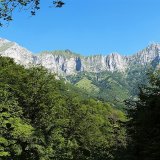The Area
Villafontanella lies in an part of Northern Italy known as the Garfagnana. This comprises the area north of the city of Lucca crossed by the Serchio river valley, bounded by the Appenines to the North and East, and the Apuan Alps to the West. High rainfall keeps the valleys lush, offering a striking contrast with the surrounding wild and craggy mountains. The scenery is beautiful in every season: if in winter it is at its most spectacular with the snow-clad peaks offering a breath-taking sight, in early summer it suddenly bursts into bloom. We then find blue gentians, white jonquils, creamy asphodels and scarlet peonies: every corner is like a naïve painting, splashes of colour enlivening the pastel green of the pastures. There are tangible traces everywhere of the relentless and unchangeable work of the forces of nature, such as the fascinating and awe-inspiring canyon, the Orrido of Botri: a deep calcareous gully carved by the waters of the Rio Pelago. A wide variety of outdoor activities may be practised here, hiking, walking and mountain biking, as well as climbing, caving, canyoning and rafting.
The most important towns are Castelnuovo Garfagnana, home in the 16th century to Renaissance poet Ludovico Ariosto, author of Orlando Furioso, and Barga, an enchanting and lively spot, hosting numerous cultural events in the summer, including a jazz festival. The thermal spa town of Bagni di Lucca, spread along the meanders of the river Lima, became renowned in the 19th century as a fashionable resort for the wealthy and artistic of Europe. It houses Europe's first ever casino and was the first town to be provided with electric lighting. Famous past residents include Byron, Shelley and the Brownings.
The beautiful city of Lucca is just 45 minutes away by car. The only old city in Italy to retain its circling walls completely undamaged, its many piazzas, large and small, connected by narrow streets and alleys, make for an enchanting experience. Known as the city of the hundred churches, which it really does possess, the range of historic architecture from the Roman amphitheatre, to Medieval and Renaissance palaces, to the Art Nouveau shop facades, is a treat for the eyes.
True to their pride in their home of Lucca, for centuries immensely prosperous and a Republic until 1848, the Lucchesi continue to date to invent themes through which to attract visitors. Throughout the year interesting cultural and commercial events are organised there, from the historical and traditional, to the lively and fantastic Lucca Comix, the second largest festival of its kind in the world, bringing freshness and vitality to this compact city of such ancient origins.
Although the Garfagnana is a land of mountains, in a mere hour by car the beautiful Versilia coast can be reached. From Marina di Pisa to Marina di Massa, this stretch of coast offers a range of beaches from the wild unspoilt Migliarino and Lecciona, to the sophisticated and cosmopolitan Forte dei Marmi.
The most important towns are Castelnuovo Garfagnana, home in the 16th century to Renaissance poet Ludovico Ariosto, author of Orlando Furioso, and Barga, an enchanting and lively spot, hosting numerous cultural events in the summer, including a jazz festival. The thermal spa town of Bagni di Lucca, spread along the meanders of the river Lima, became renowned in the 19th century as a fashionable resort for the wealthy and artistic of Europe. It houses Europe's first ever casino and was the first town to be provided with electric lighting. Famous past residents include Byron, Shelley and the Brownings.
The beautiful city of Lucca is just 45 minutes away by car. The only old city in Italy to retain its circling walls completely undamaged, its many piazzas, large and small, connected by narrow streets and alleys, make for an enchanting experience. Known as the city of the hundred churches, which it really does possess, the range of historic architecture from the Roman amphitheatre, to Medieval and Renaissance palaces, to the Art Nouveau shop facades, is a treat for the eyes.
True to their pride in their home of Lucca, for centuries immensely prosperous and a Republic until 1848, the Lucchesi continue to date to invent themes through which to attract visitors. Throughout the year interesting cultural and commercial events are organised there, from the historical and traditional, to the lively and fantastic Lucca Comix, the second largest festival of its kind in the world, bringing freshness and vitality to this compact city of such ancient origins.
Although the Garfagnana is a land of mountains, in a mere hour by car the beautiful Versilia coast can be reached. From Marina di Pisa to Marina di Massa, this stretch of coast offers a range of beaches from the wild unspoilt Migliarino and Lecciona, to the sophisticated and cosmopolitan Forte dei Marmi.
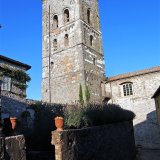
The medieval bell tower in Coreglia Antelminelli
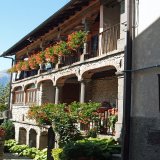
A typical town house in a Garfagnana mountain village
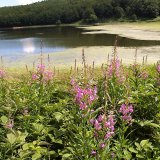
High mountain lake at end of summer: Lago Baccio
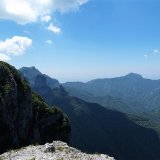
View from Monte Forato
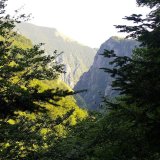
The Orrido di Botri:a spectacular gorge carved by the Pelago Torrent,north of Bagni di Lucca
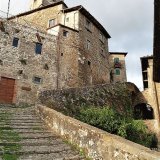
The massive walls of Tereglio: medieval fortress town
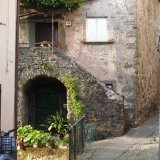
Ancient Loggia in Tereglio
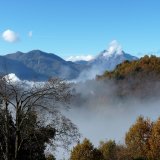
Ten minutes walk towards Gromignana from Villafontanella
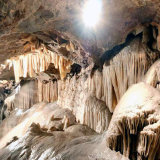
Amazing calcareous formations in a chamber at the" Grotta del Vento"(Wind Cave),near Vergemoli
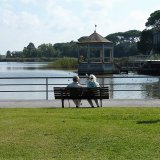
View over the beautiful lake of Massacciuccoli,near Torre del Lago
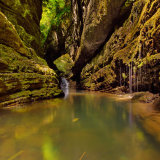
The limpid waters of the Pelago Torrent within the rock walls of the Orrido di Botri gorge
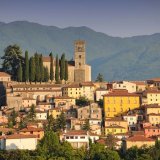
View of the splendid town of Barga,encircled by mountains
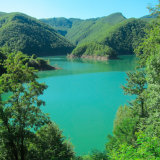
The placid azure waters of Lago di Vagli
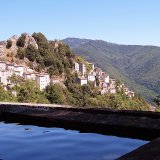
The fascinating hillside village of Lucchio, near Bagni di Lucca
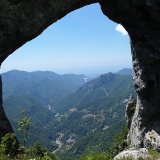
Looking straight through the arch on Monte Forato
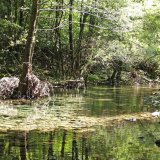
The Segone Torrent in summer
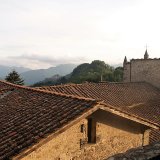
A view over the church roof at Tereglio

The splendid and largely intact medieval fortress of Verrucole, near San Romano
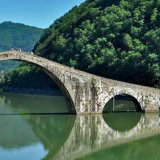
The slender grace of the Ponte della Maddalena, built in a.d. 1100, known as the Devil's Bridge, at Borgo a Mozzano
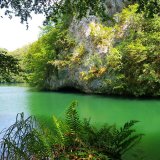
The lake at Isola Santa, Careggine
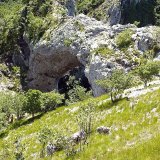
The spectacular rock arch at the summit of Monte Forato (Holed Mountain)
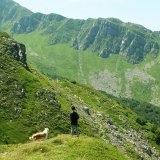
Mountain ridge near Orrido di Botri
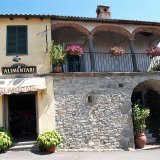
A typical house in the hill village of Pieve di Monti di Villa
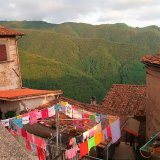
Tightly-packed village houses at Tereglio
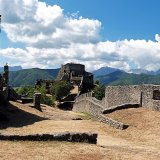
Within the walls of the Verrucole Fortress
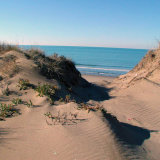
Sand dunes behind the beach at Marina di Vecchiano
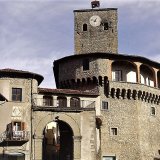
The Rocca Ariostesca at Castelnuovo Garfagnana, once home to Ludovico Ariosto
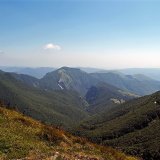
The view towards Emilia Romagna from Mount Giovo
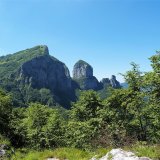
Craggy Picks in the vicinity of Monte Forato
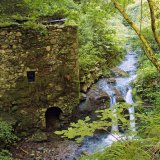
Old abandoned water mill near Bagni di Lucca
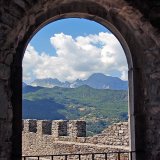
View of the tower in the Verrucole Fortress
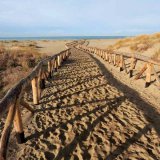
The wide stretch of free beach at Marina di Vecchiano
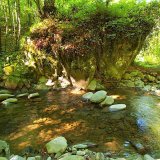
Enigmatic mass in the Segone Torrent, in the grounds of Villafontanella: great bathing pool
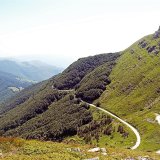
The road descending from Monte Giovo
